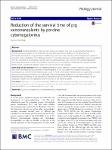Reduction of the survival time of pig xenotransplants by porcine cytomegalovirus
Denner, Joachim
Background
Xenotransplantation using pig cells, tissues and organs may help to overcome the shortage of human tissues and organs for the treatment of tissue and organ failure. Progress in the prevention of immunological rejection using genetically modified pigs and new, more effective, immunosuppression regimens will allow clinical application of xenotransplantation in near future. However, xenotransplantation may be associated with the transmission of potentially zoonotic porcine microorganisms. Until now the only xenotransplantation-associated transmission was the transmission of the porcine cytomegalovirus (PCMV) into non-human primates. PCMV caused a significant reduction of the survival time of the pig transplant.
Main body of the abstract
Here the available publications were analysed in order to establish the mechanism how PCMV shortened the survival time of xenotransplants. PCMV is a herpesvirus related to the human cytomegalovirus and the human herpesviruses 6 and 7. These three human herpesviruses can cause serious disease among immunocompromised human individuals, including transplant recipients. It was shown that PCMV predominantly contributes to the reduction of transplant survival in non-human primates by disruption of the coagulation system and by suppression and exhaustion of the immune system.
Conclusion
Although it is still unknown whether PCMV infects primate cells including human cells, indirect mechanism of the virus infection may cause reduction of the xenotransplant survival in future clinical trials and therefore PCMV has to be eliminated from donor pigs.
Files in this item

